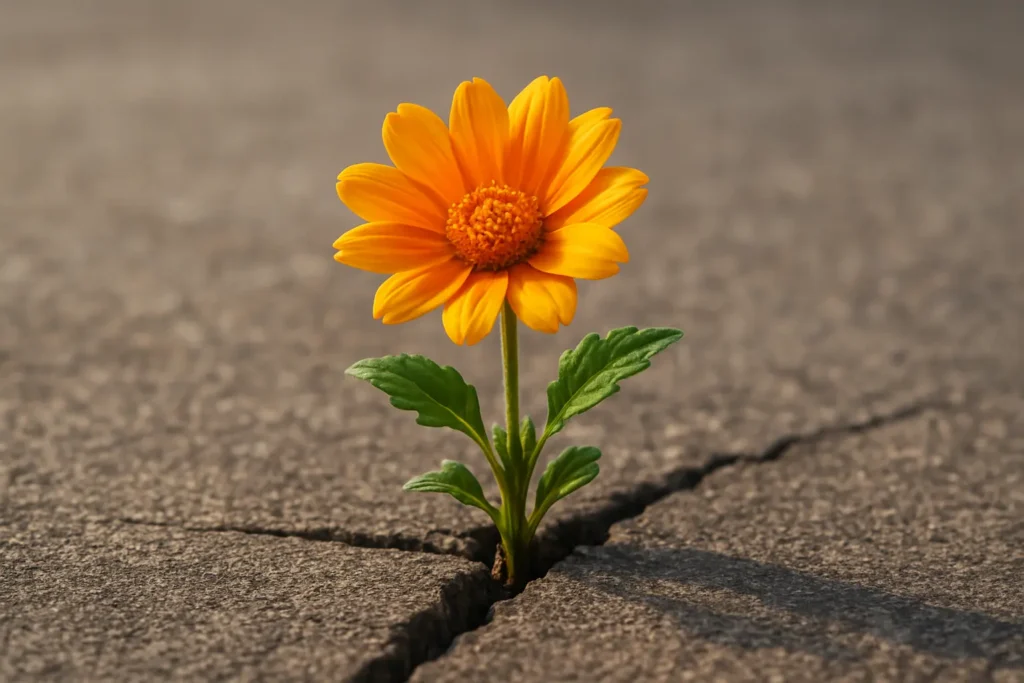In a world that constantly pulls for our attention and energy, finding inner balance is not a passive state—it’s an active practice. Cultivating mental well-being is one of the most important investments you can make in your overall quality of life.

This guide provides a foundational, evidence-based framework for three interconnected pillars: practicing mindfulness, building resilience, and adopting daily habits for a healthier, more peaceful mind.
How Mindfulness Training Directly Increases Resilience
At its core, the connection between resilience and mindfulness is simple: you cannot manage what you are not aware of. Mindfulness is the practice of paying attention to your thoughts and emotions without judgment. This is the first step to effectively managing them during difficult times.
Think of your brain’s emotional center (the amygdala) as a sensitive smoke detector. When you’re stressed, it goes off constantly. Mindfulness training strengthens your brain’s “thinking center” (the prefrontal cortex), which acts like a calm firefighter. It learns to check if there’s a real fire before sounding the alarm. This ability to pause and see things clearly is the very foundation of resilience.
Research has shown that consistent mindfulness training is a powerful, evidence-based way to reduce stress and build the mental fortitude needed to bounce back from adversity. It’s not about avoiding challenges, but about developing the inner coping strategies to navigate them.
Throughout this guide, we’ll explore practical exercises, like the body scan meditation, and discuss the many benefits of mindfulness for building a more resilient mind.
Part 1: Mindfulness & Meditation – The Art of Being Present
Mindfulness is the basic human ability to be fully present. It’s being aware of where we are and what we’re doing, and not being overly reactive or overwhelmed by what’s going on around us.
What is Mindfulness? (It’s Simpler Than You Think)
Mindfulness is the state of non-judgmental awareness of the present moment. Meditation is the formal practice you do to cultivate that state.
Think of it this way:
- Mindfulness is like being physically fit.
- Meditation is like going to the gym to get fit.
You go to the “mental gym” for a few minutes each day so you can be more mindful for the rest of the day.
Common Myths About Mindfulness
- Myth 1: “You have to clear your mind.” This is the biggest myth. Your brain is a thought machine; you can’t just turn it off. The goal of meditation is not to have zero thoughts, but to notice your thoughts without getting carried away by them.
- Myth 2: “It’s a religious practice.” While mindfulness has roots in Buddhist traditions, the practice itself is a secular, science-backed technique for training your attention.
- Myth 3: “I’m too stressed/anxious to meditate.” That’s like saying you’re too sick to go to the doctor. Meditation is the tool designed specifically to help you work with those feelings of stress and anxiety.
A Simple 5-Minute Meditation for Beginners

- Find a comfortable seat. Sit on a chair with your feet flat on the floor, or on a cushion on the floor. Keep your back straight but not stiff. Let your hands rest in your lap.
- Close your eyes gently. You don’t need to force them shut. Just let your eyelids rest.
- Focus on your breath. Don’t try to change your breathing. Just notice it. Feel the sensation of the air entering your nostrils and leaving your body. Notice your belly rise and fall. This is your anchor to the present moment.
- Gently bring your attention back. Your mind will wander. It will jump to your to-do list, a conversation you had, or what you’re having for dinner. This is completely normal. Your job is not to stop the wandering. Your job is to simply notice, “Ah, my mind has wandered,” and then gently, without judgment, guide your focus back to your breath. Every time you do this, you are completing one “rep” at the mental gym.
- End with kindness. When your timer goes off, take a moment to notice how your body feels before you jump up and move on to the next thing.
Mindfulness Without Meditation: Practices for Daily Life
You can practice mindfulness anywhere, anytime.
- Mindful Walking: On your next walk, turn off your podcast. Pay attention to the sensation of your feet on the ground. Notice the temperature of the air on your skin. Observe the sights and sounds around you without labeling them as “good” or “bad.”
- Mindful Eating: At your next meal, take the first three bites with full attention. Put your phone away. Notice the colors, smells, textures, and tastes of your food.
- Mindful Dishwashing: Instead of rushing through it, pay attention to the temperature of the water, the feeling of the soap, and the sound of the plates. Turn a chore into a 2-minute meditation.
Ready to start your practice? Follow our [Beginner’s Guide to Mindfulness Meditation].
Part 2: Building Resilience – Your Ability to Bounce Back

Resilience is not about avoiding adversity; it’s about recovering from it. It is the psychological strength to cope with stress and hardship, and it’s a skill that can be developed.
The 4 Pillars of a Resilient Mind
Resilience isn’t a single trait; it’s built on a foundation of several key factors.
- Optimism: This isn’t blind positivity. It’s the belief that you can handle what life throws at you. It’s the practice of looking for the good in situations and focusing on solutions rather than problems.
- Social Connection: Humans are wired for connection. Having a strong support network of friends, family, or community acts as a powerful buffer against stress. Knowing you are not alone makes any challenge more manageable.
- Sense of Purpose: Having a clear “why”—a set of values or a mission that is important to you—provides an anchor during tough times. When you know what you’re working toward, it’s easier to persevere through temporary setbacks.
- Flexibility: Resilient people are like bamboo, not oak. They can bend under pressure without breaking. This means being adaptable, open to new information, and willing to change your plan when it’s not working.
Key Factors That Contribute to Resilience
- Resilience is built on a foundation of optimism (a positive outlook), strong social connections, a sense of purpose, and mental flexibility.
Learn what makes people resilient in our guide: [What is Psychological Resilience and How to Develop It].
Practical Strategies for Coping with Setbacks
- Reframe Your Perspective: Your interpretation of an event determines your emotional response. Practice actively looking for the lesson or opportunity in a challenge.
- Instead of thinking: “I can’t believe I failed.”
- Try thinking: “This approach didn’t work. What did I learn, and what can I try differently next time?”
- Nurture Your Support Network: Connection doesn’t happen by accident; it requires intentional effort.
- Actionable Step: This week, send a text to one friend you haven’t spoken to in a while, just to say hello and ask how they are.
- Actionable Step: When you’re struggling, reach out to one person you trust. The act of sharing your burden can cut its weight in half.
- Focus on What You Can Control: Anxiety often comes from worrying about things that are outside your influence.
- Actionable Step: When you’re feeling stressed, take out a piece of paper. Draw a circle. Inside the circle, write down the things you can control about the situation. Outside the circle, write down the things you can’t. Make a conscious decision to focus your energy only on what’s inside the circle.
For more tools to handle tough times, read: [Strategies for Coping with Adversity and Setbacks].
Part 3: General Mental Well-being – Proactive Daily Care

Mental well-being is like physical fitness; it requires consistent, daily habits to stay strong. It’s about proactive care, not just reactive treatment.
The Foundational Habits for a Healthy Mind
The science is clear: your physical health and mental health are deeply connected.
- Quality Sleep: Sleep is when your brain cleans itself out and processes emotions. A lack of quality sleep is directly linked to poor emotional regulation and increased anxiety. Prioritizing 7-9 hours of sleep is a non-negotiable mental health habit.
- Balanced Nutrition: Your gut is often called your “second brain.” The food you eat directly impacts your mood and cognitive function. A diet rich in whole foods, fruits, and vegetables supports a healthy mind.
- Regular Physical Exercise: Exercise is one of the most powerful antidepressants and anti-anxiety treatments available. It releases endorphins, reduces stress hormones, and improves brain function. Even a 20-minute brisk walk can have a significant positive impact.
Small changes make a big difference. Explore our [Daily Habits to Improve Your Mental Health Significantly].
A Simple Technique for In-the-Moment Stress Management
- The 4-7-8 Breathing Technique: When you feel stressed, your breathing becomes shallow and rapid. You can consciously calm your nervous system by changing your breath.
- Inhale quietly through your nose for a count of 4.
- Hold your breath for a count of 7.
- Exhale completely through your mouth with a “whoosh” sound for a count of 8.
- Repeat this cycle 3-4 times.
- The 5-4-3-2-1 Grounding Technique: This is a powerful tool to pull you out of an anxious thought loop and back into the present moment. Wherever you are, notice:
- 5 things you can see.
- 4 things you can feel (the chair beneath you, your feet on the floor).
- 3 things you can hear.
- 2 things you can smell.
- 1 thing you can taste.
Your Path to a More Balanced Life
Mindfulness, resilience, and mental well-being are not separate goals but interconnected parts of a balanced and fulfilling life. Mindfulness is the practice that builds the awareness needed for resilience. Resilience is the strength that protects your mental well-being. And your daily habits are what sustain them all.
By integrating these small, consistent practices into your daily routine, you can build a strong inner foundation capable of weathering any storm.
What is one habit you will incorporate this week to support your mental well-being? Share your intention in the comments!
